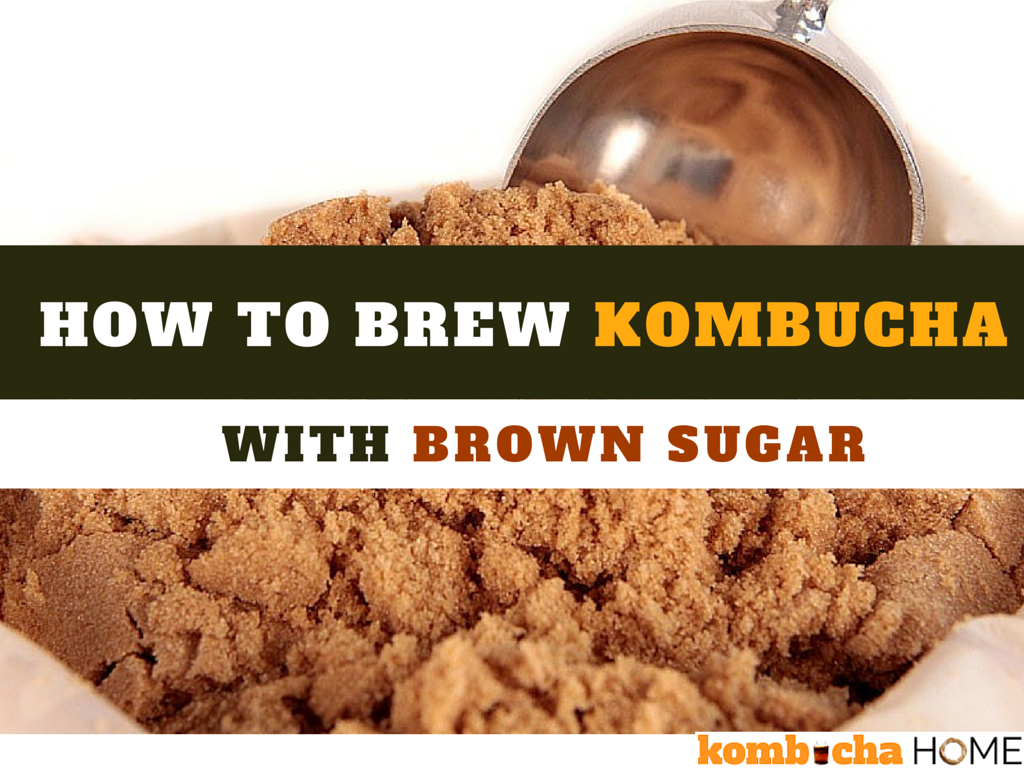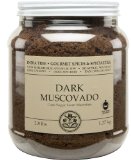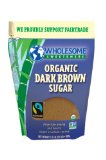How to Brew Kombucha with Brown Sugar

Brewing kombucha with brown sugar is an option. Usually kombucha making recipes call for refined white sugar. This raises concern in some people, who would prefer to use a less refined and healthier form of sucrose in their sweet tea base. While it is quite possible to brew kombucha with brown sugar, there are some considerations to take into account before swopping out the white refined sugar for less processed brown sugar.
What is Brown Sugar?
There’s many different definitions of sugar these days, so it’s confusing as to what all the labels mean.
For sugar types, here are just SOME (certainly not all) of the sugar labels:
- cane sugar
- beet sugar
- natural sugar
- brown sugar
- evaporated cane juice
- refined white sugar
However, we are talking about Brown Sugar in this case. Brown sugar comes in two types: natural brown sugar and un-natural brown sugar.
Un-Natural Brown sugar is table sugar with the molasses (the byproduct of the sugar production process) that’s manually added back into the refined (white) sugar. This is the common brown sugar you find in the grocery store, and the usual brown sugar people use for baking.
You can see our full breakdown of the best types of sugar for Kombucha here.
Another brown sugar is the natural brown sugars. These are less refined sugars that STILL have a high level of molasses content in them. These sugars have a unique, often smokey molasses flavor to them.
White Sugar vs Brown Sugar: The Health Debate
If you are concerned about the fact that sugar can be detrimental to one’s health and you are using large amounts of it regularly for your kombucha batches, keep in mind that the sugar required for the sweet tea base is for the kombucha SCOBY microbes to feed on, not necessarily for you. The longer you leave your kombucha to brew, the less sugar will be present when you bottle and drink it. There are very little to no health benefits for YOU using brown sugar over white sugar.
If adding the maximum nutrients and antioxidants to your brew from the sugar you use is the most important concern, consider using pure molasses, honey, maple syrup, or date sugar. These sugars all have more nutrients than white or brown sugar. Or simply use white sugar and add in extra nutrients via herbs, spices, and fruits in the second ferment stage.
If you choose to use Brown Sugar, you should do so based on the different flavor profile it adds to the finished product as the reason why you might choose it over white sugar — not on the added ‘health benefit’ which is minimal to none.
Why Most Kombucha Recipes Call for White Sugar
The reason that most kombucha making instructions call for the use of refined white sugar is because it is a purer form of sucrose, and the yeasts within the kombucha SCOBY can process it faster. The yeasts in the kombucha SCOBY culture turn the sucrose in sugar into alcohol, which the bacteria then feed on. The faster they can do this, the easier it is for fermentation to get going.
Using white sugar allows fermentation to take place and progress at a faster rate and there is less chance of damaging the SCOBY with the minerals present in more unprocessed forms of sugar. While damaging or compromising the health of one’s culture is of course not desired, slow ferments on the other hand are usually not something to worry about. Of course we all want to get our hands on our ready to drink booch sooner rather than later, but slow ferments usually produce a better quality kombucha.
Experts claim that the majority of the health-giving organic acids in kombucha only accumulate after 7 days of fermentation. So if your kombucha ferments are starting to sour before this, you might actually want to slow them down. Slower ferments usually also give better tasting kombucha.
So don’t worry about the slow in fermentation. That is not a problem. What you do need to keep in mind though, is the vitality of your culture. If your culture has problems processing the sugar, you may end up with a bad tasting (usually sour tasting) brew.
Why You Might Want to Use Brown Sugar
While white, refined and highly processed sugar is recommended for kombucha making, and advised for the health of the SCOBY, using brown sugar does have the added benefit of contributing a small additional amount of minerals in the form of the Molasses that has been added back into the sugar (remember: brown sugar is white refined sugar that has had the molasses added back into it).
The minerals present in brown sugar are calcium, potassium, iron and magnesium. They are there because brown sugar contains small amounts of molasses.
These minerals are however only present in trace amounts. Therefore if you are specifically interested in adding a source of these to your kombucha, a more effective option would be to use pure molasses as source of sucrose instead, rather than the trace amounts found in Brown Sugar.
Using molasses rather than brown sugar, in place of white sugar, is potentially even more stressful for the SCOBY, so I recommend you read How to Brew Kombucha With Molasses before you try it.
However, while not being specifically concerned about adding extra nutrients to their kombucha, some people just do not like the idea of heavily processed foodstuffs, and simply feel better using brown sugar.
What Can Happen When You Use Brown Sugar
Keep in mind that brown sugar MAY affect three things: SCOBY Health, Brewing Time, and Taste.
SCOBY Health
Brown sugar is a less refined and more complex form of sugar. It contains slightly less sucrose –as opposed to white sugar which is pure sucrose – and small amounts of molasses. The minerals and more complex sugars in brown sugar can make it difficult for the yeasts within the SCOBY to produce alcohol which the bacteria need as fuel. This can slow up or impede the whole fermentation process, and in some cases cause a loss of vitality to the culture.
Brewing Time
Also keep in mind that when using brown sugar instead of white sugar for your sweet tea base you will most probably find that your will have to allow for more time for your batches to mature. The yeasts usually need extra time to process that more complexes chains of molecules. This may or may not be something you want. Longer ferments usually yield a better tasting brew — but not always. I
f you do have a problem with fast brewing Kombucha and you want to slow down the fermentation time, substituting Brown Sugar instead of White Sugar may be something to consider.
Taste
The use of brown sugar results in a slight to marked difference in end taste of your kombucha. Whether or not you prefer the taste that comes from brewing with brown sugar, or the apple cider-y flavour of kombucha brewed with refined sugar, is of course a matter of personal preference.
Brown Sugar, if your SCOBY has trouble with it, may give your taste an unpleasant, sour brew. If this happens, then you know your SCOBY is not doing well with Brown Sugar and you should switch back to white sugar.
What Type of Brown Sugar Should You Use?
I recommend using the absolute best quality brown sugar you can get your hands on.
This means whatever sugar you choose, it should be the following:
- organic (from a reputable company)
- non-GMO
- from sugar cane (not from sugar beets)
Additionally, if you want to try your hand at brewing with brown sugar, you have two choices of sugar:
- regular brown sugar (white refined sugar with molasses added back in)
- natural brown sugar (unrefined sugar that still contains molasses in it) such as:
- Muscovado
- Sucanat
- Piloncilo
- Turbinado
- Demerara
Personally, I recommend one of the natural brown sugars which are less processed than the common ‘un-natural brown sugar’ and have a more smokey, molasses flavor to them. They just taste better and give a stronger flavored Kombucha that I quite like. However, the natural brown sugars may be quite expensive.
Best Natural Brown Sugar
I recommend India Tree Dark Muscovado Sugar. It’s an awesome tasting sugar and I love using it for everything — baking, coffee, and everything in between. It’s also my go-to choice for Kombucha brewing, if I’m using a brown sugar. It has a moist, smoky molasses flavor which adds a lot of flavor profile to the brew — far more so than regular brown sugar. You can also try one of the other kinds of sugars or another brand of Muscovado, but this is the one I love. It’s pricey though.
Best Un-Natural Brown Sugar
For regular (yet still high quality, organic, non GMO) brown sugar, I recommend the Wholesome Sweetner’s Dark Organic Brown Sugar. This is better brown sugar than you’ll find at your local grocery store and while you may pay a bit more for it than off-the-shelf brown sugar, it’s worth it. I recommend this one from Amazon because it comes as a pack of 6, 24 ounce pouches — a good bulk amount of it.
How to Brew Kombucha with Brown Sugar
Kombucha cultures are pretty tough things, so it usually takes quite a lot to actually kill one. However, brewing with a sub-healthy culture can lead to frustration as ferments are erratic and one can encounter problems which would not crop up if the culture was in top form.
While being tough, kombucha SCOBY cultures are also moderately adaptable. If adapted to a certain condition or food source, even if it is not optimum, they can continue to thrive and produce good ferments if conditions and ingredients are kept consistent and stable.
This means, if you decide that you want to brew full time with brown sugar, it is possible to “adapt” your culture to brown sugar by gradually getting it used to processing the more complex form of sucrose.
Slowly ‘adapting’ your SCOBY to brown sugar may give a better tasting brew (with less chance of an off-tasting sour brew) than simply doing a cold switch to brown sugar from white sugar.
Before you start doing this however, I would advise that you make one brew using all brown sugar first. If you are worried about your SCOBY you can always do it with a spare one from your SCOBY hotel. It is important to do this once, because as mentioned above, the taste difference between batches made with brown sugar and batches made with white sugar is quite wide.
Once you have established that you still like the taste of your kombucha when it is brewed with brown sugar, then you can start the change over process.
How to Gradually Adapt SCOBY to Brown Sugar
Here’s the slow process that will take between 1 month to 2 months. I recommend this method. If you don’t have the patience, you can fully make the switch right away instead of via increments.
Step 1: Mix Brown Sugar and White Sugar
Start your new batch by replacing a small portion of white sugar with brown. You will be using mostly white sugar, but removing some and replacing it with brown so that the SCOBY can start adapting.
If you are doing an average size brew, I would recommend that you replace the white sugar with brown in 1/4 cup increments. This means that if you are using three cups of sugar per batch, it will take you 12 brewing cycles to switch over completely.
If you are brewing small quantities of kombucha, then rather replace the sugar in 1/8 cup increments.
Step 2: Increase the Ratio of Brown Sugar to White Sugar Each Cycle
Every cycle, increase the the ratio of brown sugar to white sugar by 1/4 a cup. So if you normally make 1 gallon batches with 1 cup of sugar, it will take 4 brew cycles (about a month and a half) to switch over completely.
Step 3: Taste Test Each Brew Cycle
I recommend you specifically taste test each cycle to see how you like the results. If you reach a point during the switchover where you really like the taste, remember that you can always leave it there at that brown sugar to white sugar ratio permanently. This has the advantage of giving the SCOBY easy to process sugar (white refined) while still adding in some extra minerals and more flavor profile from the brown sugar.
The Immediate Switch to Brown Sugar
For those who don’t want to do the gradual switch over to brown sugar, the process is simple: just replace your white sugar with brown sugar.
This means you’ll use about 1 cup of brown sugar per 1 gallon of tea right away.
Make sure you keep an eye on how things go and taste test every couple days. You may find the SCOBY needs a couple days to a week longer to ferment. The risk of getting a sour, off-tasting brew is higher with this method. However, you may find you have no issues at all.
All The Sources of Sucrose
If you want to find out more about sugars and other forms of sucrose you can use for your kombucha, have a look at The Ultimate Guide to the Best Types of Sugar For Brewing Kombucha.
Make sure you check out our other advanced Kombucha sugar-replacement guides:
- How to Brew Kombucha with Molasses
- How to Brew Kombucha with Honey
- How to Brew Kombucha with Maple Syrup
While using refined white sugar does not necessarily pose a health threat if you leave your brews to mature adequately as most of the sugar will be processed out by the SCOBY microbes, using alternative sources of sucrose can make for interesting flavours and more nutrient dense ferments.
Make sure to keep some backup SCOBYs in your SCOBY hotel, and you are then free to experiment with ingredients and flavours to your heart’s delight. : )


